Robert Gertz
I help universities turn their complex course development challenges into engaging learning experiences powered by instructional design best practices and multimedia-rich technology integration.
About Me
I’m an instructional designer with a background as a philosophy professor and over a decade of experience in higher education. I specialize in helping universities turn complex course development challenges into clear, engaging online and hybrid learning experiences.

My path to instructional design began in the classroom, teaching ethics, logic, and philosophy to students at every level. Along the way, I discovered the power of design to transform learning. Today, I bring a thoughtful, collaborative approach to every project, combining research-driven design practices with a deep curiosity about how people learn.I enjoy building courses that are not only intellectually engaging but also inclusive, well-structured, and designed with students in mind. My aim is to help learners connect ideas to real-world challenges and practical applications.
My Work
Contact Me
If you want to learn more about me, please reach out by visiting the links below or visiting my contact me page.
Instructional Design
Resume
Professional Summary
I help universities turn complex course development challenges into on-time online, hybrid, and face-to-face learning experiences powered by instructional design best practices and multimedia-rich technology integration. Having taught in the classroom and in various online environments, I know effective design entails collaborative course development, where faculty are supported and students feel empowered.
Instructional Design & Curriculum Development Experience
INSTRUCTIONAL DESIGNER & SUBJECT MATTER EXPERT, August 2020 - Present
Forbes School of Business & Technology at The University of Arizona, Global Campus, Tucson, Arizona
• Collaborated with different departments and individual faculty members on several courses for adult learners, including a redesign with 9 academic stakeholders comprised of educational leadership, SMEs, assessment specialists, and quality managers in a Quality Matters environment aligned with UDL principles.
• Executed an end-to-end redesign to create a scalable, competency-based business ethics course, surpassing the target benchmark in feedback surveys and increasing student satisfaction by 18%, primarily in ratings for “strong agreement” that the course delivered a high-quality educational experience.
• Designed 24 multimedia-rich web-based lectures for Canvas LMS with modular layouts, interactive elements, and scaffolding to enhance learner engagement, introducing new methods and technologies.
• Developed gamified interactive assessments and a 3-minute microlearning video synthesizing complex theories into digestible and accessible content, supporting ADA standards for diverse learners.
• Applied data-driven iterative design improvements across multiple courses in collaboration with assessment specialists and other stakeholders.
ASSOCIATE FACULTY, September 2013 - August 2020
Ashford University, San Diego, California
• Instructed 50+ asynchronous undergraduate and graduate courses for adult learners, receiving recognition for high retention and learner engagement.
• Collaborated with academic teams to revise and modernize the curriculum, integrating project-based learning methods and ensuring course integrity, consistency, and innovation.
• Supported faculty through collaboration and iterative improvement of course components and continuous improvement of delivery methods, researching and identifying best practices and technology trends.
Additional Leadership & Project Management Experience
RESIDENT MANAGER & TECHNOLOGY SPECIALIST, January 2014 - October 2021
International Student House, Washington, DC
• Managed strategic, complex projects, including a $100K capital campaign and technology infrastructure upgrades serving 200+ devices.
• Oversaw staff with a focus on mentorship, continuous improvement, and mission alignment in a high-growth educational community.
Skills
Instructional Design & Curriculum Development • Online, Hybrid & Face-to-Face Course Development • Project Management • Agile Mindset • Faculty & Stakeholder Collaboration • Multimedia & Interactive Learning Tools • Training Materials • Technology Integration • Data-Informed Course Evaluation • Quality Assurance (QM) • Canvas LMS • Documentation & Knowledgebases • Works Independently & Cooperatively • Oral & Written Communication
Education
PhD | Philosophy |Temple University | Philadelphia, PA
BA | Philosophy | Minor: Sociology and Anthropology |Gustavus Adolphus College | St. Peter, MN
If you want a PDF copy of my resume, click the button below.
Curriculum Vitae
Summary
As an educator who has designed and developed philosophy courses as well as taught over 50 courses for adult learners, I understand the nuanced challenges of delivering rigorous, human-centered learning experiences. I’ve cultivated inclusive environments that support intellectual and personal growth, supporting students’ success through constructive evaluation and engaging lessons.
Areas of Specialization
Ethics, Logic, Critical Thinking & Argumentation, Scholarly Research Methods, Social Philosophy
Areas of Specialization
History of Ancient Philosophy, History of Modern Philosophy, Pragmatism
Areas of Competence
Ph.D. | Philosophy | Temple University | Philadelphia, Pennsylvania
BA | Philosophy | Minor: Sociology &Anthropology |Gustavus Adolphus College | St. Peter, MN
Doctoral Dissertation
Title: Moral Code: The Design and Social Values of the Internet
Committee: Carol C. Gould (chair), Paul Taylor, Joe Margolis, Joseph Schwartz, Jane Gordon
Added to the philosophical study of the Internet by identifying the interests embodied in its basic design and the implications that these embodied interests have for its use, particularly in relation to current social and political debates about technology in a global context. I investigated how regulation of content, government appropriation, and commercialization are debated through the Internet.
Courses Taught
DOCTORATE LEVEL COURSES:
Advanced Study in Qualitative Research
A doctoral-level study of research design and qualitative methods, evaluating which designs would be appropriate for particular dissertations, and training in research ethics.
Scholarly Argument
This advanced research seminar concentrated on the content and form of scholarly arguments, involving methodological elucidation, literature reviews, and other skills needed to succeed in doctoral dissertations.
Professional & Business Ethics in Organizational Leadership
This advanced seminar explores foundational and contemporary issues in business and professional ethics, emphasizing the application of ethical theories to professional practices and organizational decision-making.
Advanced Social Networking for Organizations
This advanced seminar analyzed the evolving role of social media and technologies in the transformation of large organizations and their leadership, including ethical questions surrounding media and public relations, promotion and identity, workplace governance, and globalization.
FIRST YEAR, UPPER, AND SENIOR LEVEL COURSES:
Business Ethics
This course examined ethical theories, economic concepts, and business paradigms for an analysis of moral problems in business, including the perspectives of consumers, employees, and business owners.
Practical Ethics & Moral Reasoning
This course debated real-world problems by applying logical arguments to practical decision making, including medical controversies, capital punishment, war, race, poverty, animal rights, and environmentalism.
Introduction to Logic
This course introduced the basics of logic, covering the theory of syllogism, symbolic methods for representing and assessing the logical properties of arguments, inductive and deductive reasoning, and common fallacies.
Introduction to Philosophy
This course investigated literature, problems, and methods found in classical and contemporary philosophical writings, such as the nature of truth and knowledge, mind and body, and freedom and determinism. This course also distinguished good and bad arguments, rationally justifiable solutions, and different global perspectives.
Philosophical Challenges to the Individual
This course investigated central, recurring problems of philosophy, including purpose of philosophy, skepticism, mind-mind problem, identity, free will, ethics, Eastern and Western moral approaches, and meaning of life.
Curriculum Development & Course Design
Professional & Business Ethics in Organizational Leadership
I completed an end-to-end development in collaboration with academic leadership and assessment teams, updating the curriculum and instructional materials to meet current standards for doctoral students while aligning outcomes, content, and assessments. Emphasizing active learning, I designed a scaffolded structure with scenario-based projects, real-world examples, group work, role-playing, and reflection. Post-implementation student satisfaction surveys showed an 18% increase in receiving a high-quality educational experience. The course was well-received, prompting interest from stakeholders in adapting it for other departments.
Practical Ethics & Moral Reasoning
I collaborated with different departments and individual faculty members to revise this undergraduate course’s curriculum for adult learners in a QM Matters environment aligned with UDL principles. Influenced by data-driven assessments and with a scholar-practitioner mindset, I integrated proven instructional design methods to increase engagement and knowledge transfer such as backward design, ADDIE, and Bloom’s Taxonomy. I created interactive gamified assessments and a 3-minute microlearning video synthesizing complex theories into digestible and accessible content.
Professional Appointments
CURRICULUM DEVELOPER, DESIGNER, ASSOCIATE FACULTY, 2020-Present
Forbes School of Business & Technology at The University of Arizona Global Campus
Tucson, Arizona
Invited to the school to develop the Ph.D. curriculum in ethics and improve content material, I additionally taught business ethics, digital communication in organizations, and cross-disciplinary academic research courses. As part of the Organizational Development and Leadership department, I also served on dissertation committees.
Notable accomplishments:
• Navigated diverse opinions and requests on a team of 9 university stakeholders representing academic leadership, assessment specialists, quality control managers, and learning resource consultants during curriculum development and course design.
• Designed 24 multimedia-rich lectures for Canvas LMS with modular layouts, interactive elements, and scaffolding to enhance learner engagement, introducing new methods and technologies.
• Garnered data analysis to make content decisions to increase student achievement with a goal of 20%.
• Created visual tools and videos for use across different programs and diverse communities of learners.
• Supported faculty through collaboration and iterative improvement of course components and continuous improvement of delivery methods, researching and identifying best practices and technology trends.
• Mentored and advised students in their academic development and served on dissertation committees.
ASSOCIATE ONLINE FACULTY, 2013-2020
Ashford University
San Diego, California
Taught and evaluated students in over 50 online didactic courses at all undergraduate levels, excelling at the ability to convey complex philosophy skills and concepts to any student. Invited to serve on committees and rework courses to strengthen content and foster knowledge transfer.
Notable accomplishments:
• Collaborated with colleagues to research and develop new logic course, enhancing instructional quality and learner outcomes.
• Recognized for high student retention rates due to actively engaging students and motivating them to succeed, providing development, administration, teaching, and evaluation of learners.
• Advised and mentored students at the individual level about academic careers and future plans.
• Monitored performance in accordance with course objectives to improve materials for students.
ADJUNCT PROFESSOR OF PHILOSOPHY, 2003-2005
Montgomery County Community College
Blue Bell, Pennsylvania
Independently designed and instructed in-person courses, including creation and grading of exams and written assignment.
Notable accomplishments:
• Promoted an open and interactive classroom environment with genuine energy and enthusiasm for their learning, where lessons were shaped by student interest and input.
• Promoted diverse perspectives involving problem-based and project-based learning, assisting learners with study problems and with evaluating their potential for successful achievement in the course.
ADJUNCT PROFESSOR OF PHILOSOPHY, 2003
Temple University
Philadelphia, Pennsylvania
Related academic lessons to personal development and practical consequence through lectures for second- and third-year undergraduates, enhancing the development of their competencies.
Notable accomplishments:
• Varied instructional strategies and effectively utilized resources, maintaining accurate attendance and performance records of learners and submitting required reports according to published deadlines.
Service and Certifications
Dissertation Committee Member: John Radman (Ph.D.), Strategies to Prevent Resistance in Change-Committed Employees: An Exploratory Case Study, University of Arizona Global Campus, in progress.
Certification: Collaborative Institutional Training Initiative (CITI) Program for Social & Behavioral Research, Stage 1 Basic & Responsible Conduct of Research (RCR) for Curriculum and Course Learner Group, April 1, 2024.
Leadership: Spoke at Doctoral Graduation Virtual Celebration as part of the leadership of the department in 2020.
Departmental Contributions: Created content as part of a small team developing business ethics material for a specific course as well as widespread departmental use in 2020.
Committee: Served on a committee to redevelop an Informal Logic course at Ashford University from 2016-2017.
Related Professional Experience
My extensive work experience as an administrator in higher education has enhanced my skills at understanding and developing students as well as taught me the value of service in the academic community.
RESIDENT MANAGER, 2014-2021
International Student House
Washington, DC
Project Management & Development:
• Managed a diverse resident population from approximately 30 different countries and developed programing to cultivate international dialogue and understanding between 100 residents in the community.
• Harmonized communication and technology needs, provided operational support, and managed technology infrastructure upgrades serving 200+ devices.
• Directed building improvement projects with efficiency, completing a $100k capital campaign and historical preservation project involving simultaneous vendor engagement ensuring cost-effective results.
• Addressed and updated community policies involving multicultural and gender issues.
Supervision:
• Recruited, trained, and supervised Deputy Resident Managers and created processes through G Suite.
• Managed the maintenance and housekeeping operations, including a team of five people.
Committee Service:
• Lead board committee that governed strategic direction of estate with a property value of $14.5 million, tying project goals to the mission of the organization and unifying cross functional teams in the organization.
• Represented the organization at NAFSA, Association of International Educators.
RESIDENT DIRECTOR, 2004-2014
RESIDENT COORDINATOR, 2001-2003
Temple University
Philadelphia, Pennsylvania
Project Management & Development:
• Grew private partnership by 30% through cultivating relationships with corporate leaders in a competitive housing market for a leading university.
• Supported university academic objectives through program collaboration with 3 different departments developing curriculum and assessment that contributes to student success.
• Developed and delivered presentations: Game Theory and its Application to Residential Life, Time Management vs. Stress Management, the Advantages and Concerns of Facebook, and Conflict Mediation.
Supervision:
• Lead and developed efficient and diverse team of 24 graduate and undergraduate assistants and administrative staff with proactive mentorship, completing 1:1s and performance reviews, inspiring high-value standards and invested team members across a variety of organizational levels and backgrounds.
• Consistently tapped by the Conduct Office to serve as chair of university-wide Code of Conduct hearings, maintaining the university brand of student integrity.
Committee Service:
• Served as Chair of the Operations and Community Service Committees and as a committee member of Living Learning Communities, Residential Educational Curriculum, and Assessment.
• Planned and implemented MACUHO Student Staff Live-In Conference One-to-One Academy.
• Handled high-pressure emergencies and effectively collaborated on medical and mental health crises and criminal investigations as the on-call staff member resolving concerns for a 5,000-student population.
Statement on Teaching and Content Creation
I help people develop the habits of reflecting on the world, assessing assumptions, seeing alternatives, sharing their ideas, and taking responsibility for their learning. To help people take responsibility for their learning, I must help them understand that teachers and classes are not to be treated passively. While I expect students to engage with the materials and lessons, it is most important to me that they begin developing critical reasoning skills. To this end, I seek a balance in my courses between lecturing and asking challenging questions to students to lead them to self-discovery. I encourage students to engage with the material, with the instructor, and with each other in the belief that learning happens best through intellectual exchange. Above all else, I want my students to understand that their thoughts and their opinions matter in the learning process. This means that classrooms and instructors must embrace the students’ opinions with respect and fairness.Participation is vital to creating a sense of social safety in the classroom. Sharing allows the class to connect the lessons to real experiences. In building a community, it is helpful to have students take turns moderating discussions, where the instructor participates in the discussion alongside other students who take part in leading it. Additionally, while feedback to individuals directly and to the class as a whole is important, I also think it is helpful to create supportive forums for the students, where students alone can assist each other with their studies and even offer suggestions as a group for different directions of the course. In other words, I want students to feel that they have a voice in the class. I want them to feel that they belong to a community of learners who are participating in the success of the course.Lastly, I believe that there is a stake in the development of our intellectual skills, that is, it can improve the choices that we make in the world. During my courses, I aim to show how philosophy and the world can illuminate and inform each other. I begin each lesson with its importance, emphasizing that the lesson should be studied because it has significance. I encourage my students to be open to the possibility that the material might be meaningful to their lives. In my classes, I try to share my interest in philosophy and my belief in students’ abilities to find unique insights. I have found that they often rise to my high expectations of them when given the chance, finding unrecognized value and talent. Of course, not all students can rise to the same expectations, but I never stop striving to help them reach their personal best. I ask my students to critically engage with the material and share how their learning experience might be improved. And by learning about these better ways, education can improve and grow to address a wider audience and have a greater impact.
If you want a PDF copy of my CV, click the button below.
WRITING SAMPLE
MORAL CODE: THE DESIGN AND SOCIAL VALUES OF THE INTERNET
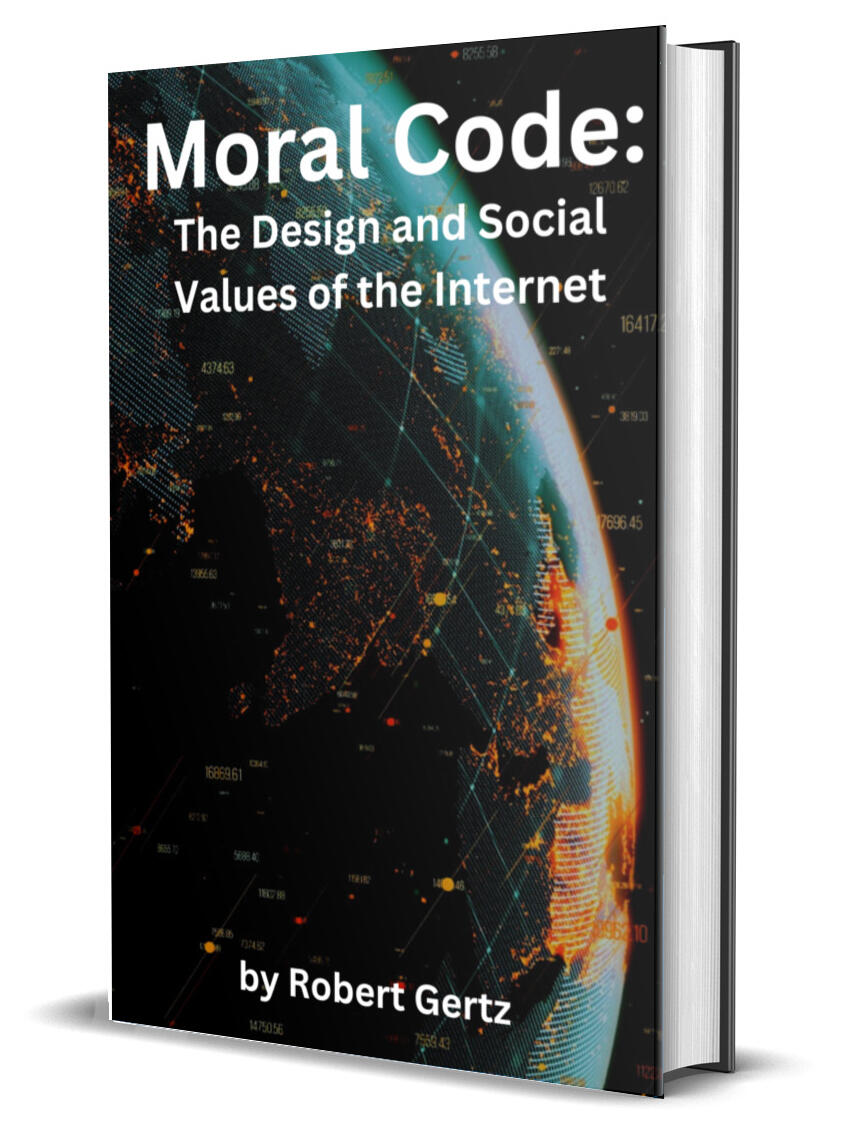
SYNOPSIS
While the Internet has not gone unnoticed in philosophy, philosophical investigations have mainly focused on social responses to the Internet and envisioning future forms of social life with technology. There has been less attention given to how the technical details of the Internet limit or expand these possibilities through its basic design. My philosophical framework for such a study, indebted to the work of Karl Marx, Herbert Marcuse, and Andrew Feenberg, investigates the social and historical relations that result in the embodiment of specific interests in the Internet.Starting with a Marxian analysis, I contextualize the Internet as a system of production, distribution, and consumption of information, goods, and services involving both use-value and exchange-value. With this understanding, alienation can be facilitated through the growth of capitalistic enterprises on the Internet as well as oppression through the manipulation of the technology.Also, integrating a social constructivist approach, I explore the Internet itself as neither neutral nor one-dimensional. The social and the technical are intertwined, so it is not simply conceived as a technical phenomenon or a social phenomenon. Social interests are embodied in the evolving design of the technology, although so are governmental, legal, and corporate interests. It is these latter interests that prove the significance and the influence of the technological design, along with the need for its careful study.Many users of the Internet have become familiar with the empowering and emancipatory features of the Internet, engaging in positive relations through embodied social interests in the technology. However, since the 1990s, commercial commodification and globalization have created embodied interests in the Internet that more and more dominate its use. While potentially oppressive when appropriated to satisfy the needs of commercial advertising and dominant social relations, the Internet still can incorporate alternative interests and uses through dispersed collaboration and participation, which enables Internet technology to remain minimally coercive. However, user agency must extend beyond the passive, undiscerning use of the technology.
If you want to view the full text, click the button below.
How may I help you?
Use the Calendly link below to book a 30-minute call where we discuss how I might be able to help you.
Prefer to connect via email?
Instructional Design
Portfolio
Welcome!I’m an instructional designer and learning experience strategist dedicated to creating meaningful, inclusive, and engaging educational experiences. With a background in higher education and a deep understanding of adult learning, I bring together pedagogy, creativity, and technology to design content.
End-to-End Course Redesign
Audience: Various Curriculum Stakeholders, including adult learners pursuing a doctorate in change leadership at a business schoolResponsibilities: Curriculum Design & Development, Instructional Design, Learning Experience Design (LxD), Assessment Strategy, Quality AssuranceTools: Canvas, Getty Images, Microsoft Teams
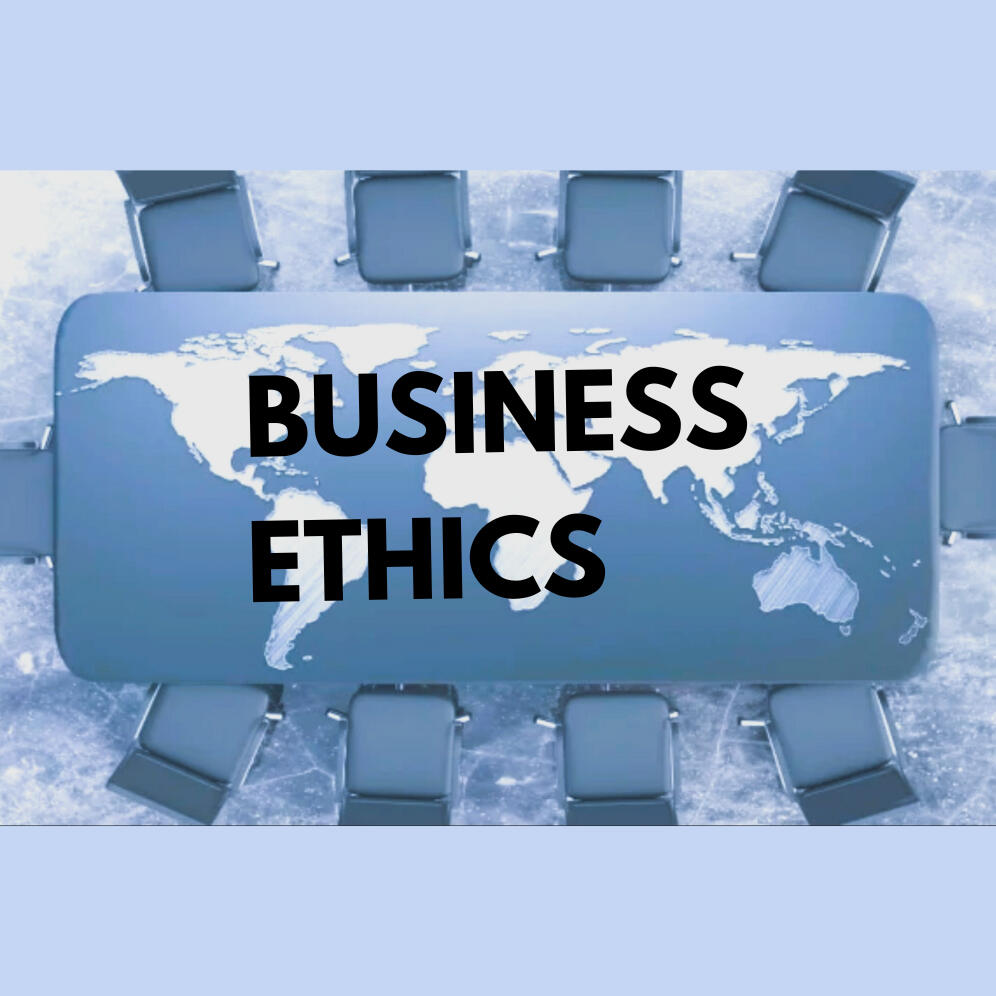
About the Project
I revamped an outdated online course that lacked relevant theoretical instruction and was underperforming in its targeted learning objectives. I led its end-to-end instructional redesign by aligning strategic curriculum goals with engaging, research-informed learning experiences.Replacing a fragmented instructional approach, I scoped an iterative course built upon current scholarship and tied it to real-world scenarios, resulting in the learner’s ability to present business acumen, critical thinking, and balanced reasoning.Redesigning the course to meet the institution’s and the students’ needs, a primary focus was to produce strong learning objectives and enhance the course’s effectiveness beyond its current underperforming assessment. I aimed to build a pedagogically sound course and improve learning outcomes by 20%.
Challenge
Creating an engaging and relevant ethics course for business leaders while advancing the department’s curriculum.
Solution
I redesigned the course, ensuing that the objectives, content, and teaching methods aligned with academic standards and the institution’s goals.
Approach
I collaborated with a team of university stakeholders representing academic leadership, assessment specialists, quality control managers, and learning resource consultants. Their diverse opinions and interests were translated into targeted learning experiences.Using the ADDIE model, backward design, and Bloom’s taxonomy, my redesign phase began by evaluating recorded issues with student learning, engagement, and transfer of knowledge to real-world applications. Considering the Kirkpatrick Model of Evaluation, I also calculated what new course would most benefit the institution.
Process
Analysis
As the ADDIE model suggests, I began with analysis by meeting with the project owner to understand the big picture problems and project goals. I reviewed the course and existing assessments, and interviewed students and other SMEs.As institutional stakeholders highlighted, there was a need to meet learning objectives better. As seen below, the success of the objectives was underperforming both while the course progressed (Chart 1) and after it was completed (Chart 2).
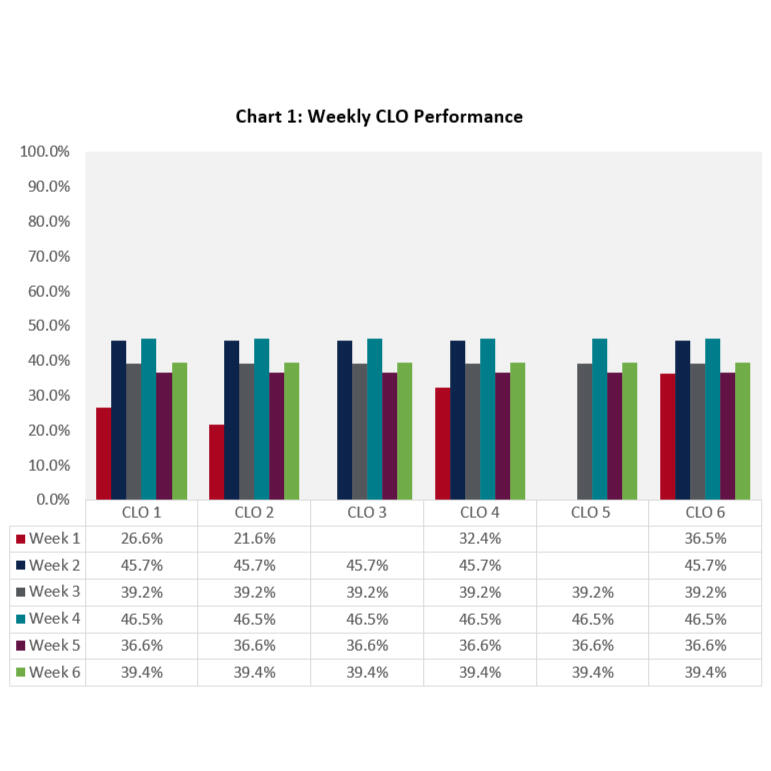
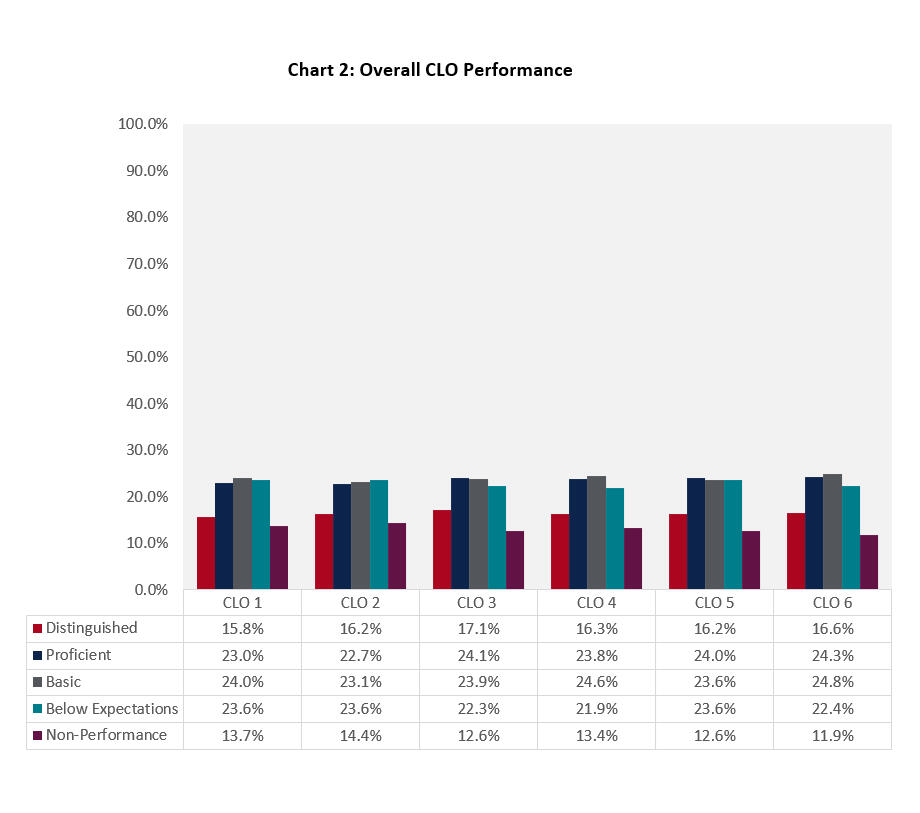
Reimagining
Applying backward design, I wrote an outline of the course (pictured below) that carefully designed the learning experience. With targeted learning objectives and real-world case studies, the lessons, interactive engagements, and learning assessments received stakeholder support.

Influenced by the Universal Design for Learning (UDL), I incorporated a variety of purposeful, motivating activities accommodating different learning preferences and abilities, including role playing, role reversal, thought experiments as well as presentations and group projects.Through text, images, graphics, and video, I presented instruction in multiple formats to support diverse learners, especially in lectures. Also, I was careful that accessibility standards were met, and the design adhered to ADA compliance guidelines.
Mapped
To illustrate that SMART learning goals were created and integrated, I made a course map to show their alignment with course instruction, activities, and assessments.

Written and Implemented
With an iterative approach and collaborative check-in meetings, a complete course guide was written and formatted for easy transfer into the LMS Canvas. After the credit hours were calculated and the requirements were met, the course was implemented. During this phase, I held conversations with instructors and created teaching aids. A PDF of the course guide can be accessed below.
Response
This redesign was successful. One project leader noted that everything was completed ahead of time and under budget.After the project was completed, the course was recommended by institutional stakeholders for use in other departments and the Chinese market, and other courses would go onto embrace some of my design elements.Having the chance to teach the course and interview students afterwards, they particularly appreciated the careful scaffolding of the course and their increased ability to articulate the knowledge they learned in professional environments.Surpassing the target rating in learner feedback surveys, the redesign achieved an 18% increase in positive feedback, driven primarily by a rise in “strong agreement” that the course delivered a high-quality educational experience. This increase has remained consistent as the course is taught.In future iterations, I would recommend enhancing engagement with more instructor-student interaction (RSI) through synchronous class meetings.
Testimonials
Instructional Video
Audience: Various Curriculum Stakeholders, including two SMEs and adult learners with diverse interests in their first year of undergraduate studyResponsibilities: Instructional Design, Subject Matter Expert, Visual Storyboard, Videography, Audio Narration, Video EditingTools: OBS Studio, DaVinci Resolve, Zoom, Getty Images
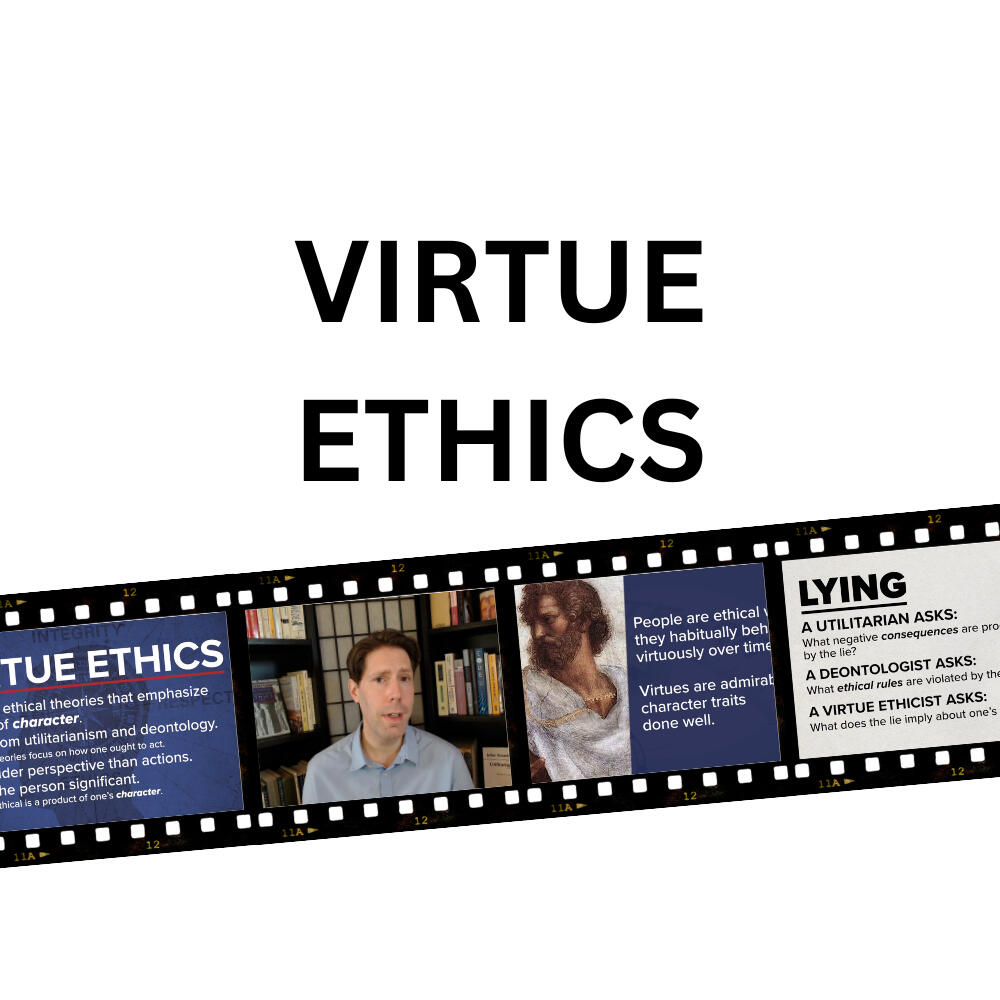
About the Project
While redesigning an undergraduate course, a culminating learning experience was needed for a three-week series of philosophical lessons. Using a microlearning strategy, I developed a short, instructor-led video that synthesized the past lessons in an engaging, digestible format.
Challenge
A clear synthesis of three weeks of lessons on philosophical theories was needed, unifying the learners’ experiences while also explaining how to put the lessons into practice. The learning objective was the application of key philosophical theories to practical ethical practice in realistic scenerios.
Solution
A clear, multimedia experience accessible to all learners. I made a video with myself as the instructor and included informative visuals and several pause-and-reflect moments to support retention. I also put the lessons in action in real-world settings. To meet ADA standards and UDL principles, a script of the video was included to support screen readers or closed captions.
Approach
Using strategies of microlearning and Mayer’s research-backed Multimedia Learning Principles, I aimed to avoid cognitive overload by visually signaling the organization of the material and personalizing the experience with a conversational tone.
Process
Script
With a tight timeline, I wrote and edited the script for a three-minute video. I collaborated closely with the other SMEs to vet the content and consulted with the instructional support team for platform compatibility through Kaltura into Canvas.
Style Guide
I created a style guide to gather color combinations and inform set design. From the background to the visual slides, I maintained a consistent visual style for each element.
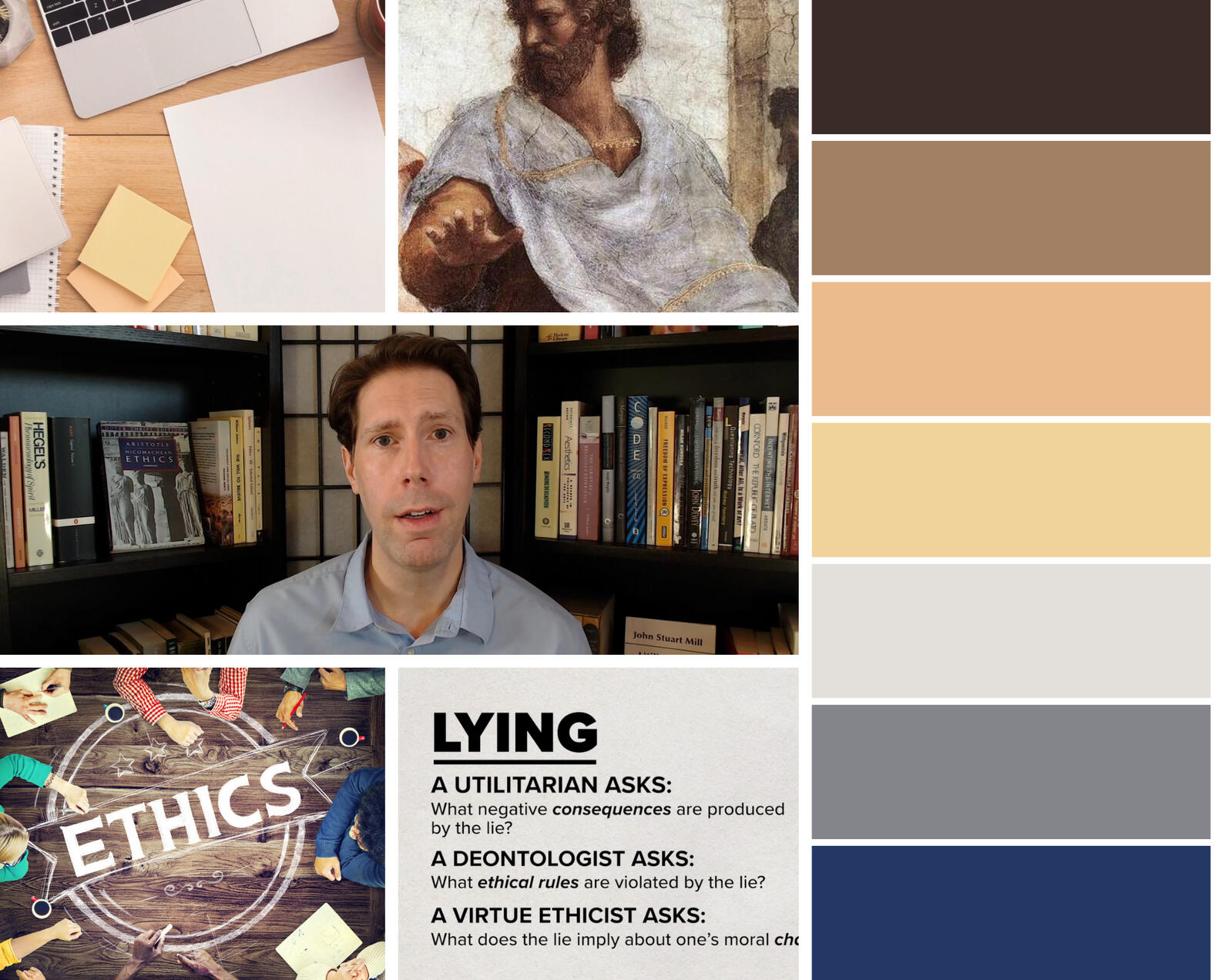
Visual Storyboard
From the script, I created a full visual storyboard, with screen-by-screen narrative, visuals, and text slides
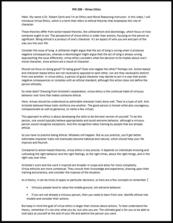

Test Video
I submitted a test video of myself to the producer. He approved of it. Given its quality, he also asked to use it as an example for his other clients.
Editing
To streamline production, I edited together footage in DaVinci Resolve to complement my storyboard, ensuring the most effective footage was used.
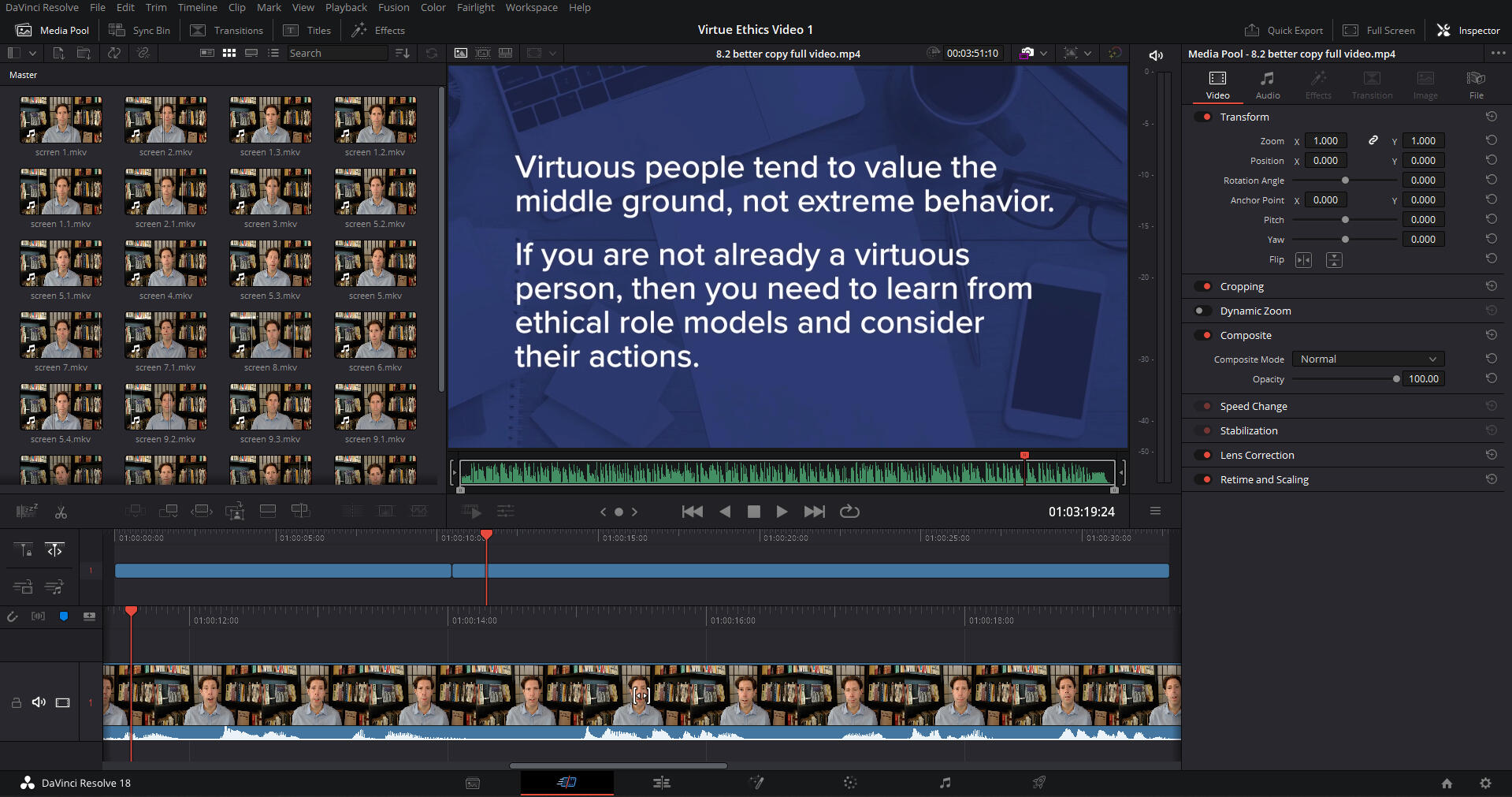
Response
All stakeholders were pleased with the project. Despite a tight timeline, the project was completed without delay or issue. The video is still being used for that piece of instruction.
Testimonials
Gamified Interactive Assessment
Audience: Various curriculum stakeholders and adult learners with diverse interests pursuing undergraduate degreesResponsibilities: Instructional Design, Subject Matter Expert, eLearning Content CreatorTools: Microsoft Teams and Zoom

About the Project
While gamifying the modules of an undergraduate course, a step in the game’s journey of progressing levels to the top of a mountain was needed. I developed an assessment aligned with the module’s learning outcomes that was engaging, informative, and provided immediate feedback.
Challenge
Align learning objectives with an assessment that retained learner engagement and reinforced knowledge transfer.
Solution
Weaving the assessment into the larger narrative of the game, the lesson became part of this story, increasing the knowledge retention by transforming abstract content into narrative-driven, problem-solving challenges.
Approach
After identifying the critical competencies of the learning module, I developed an assessment that allowed learners to apply their knowledge within the gamified structure of the course. The assessment was designed to minimize cognitive load and maximize learning transfer. I was mindful to limit the amount of instructional content presented and created questions that promoted reflection. Applying elements of Keller’s ARCS Model on motivational design, feedback was provided after every question to encourage resilience and a growth mindset, assisting learners if they needed to retry the questions. In the end, the assessment awarded learners digital “tools” needed to accomplish the overall mission of the game.
Process
Insights
After analyzing the lessons in the context of the course and learners’ experience, I concluded that the course could be strengthened by including more scaffolding through structured activities, guided practice, and timely feedback. Furthermore, collected data showed that performance for most learning outcomes declined after the first section of the course (see the chart below), supporting the need for cognitive load management, progressive skill-building, and learner confidence.
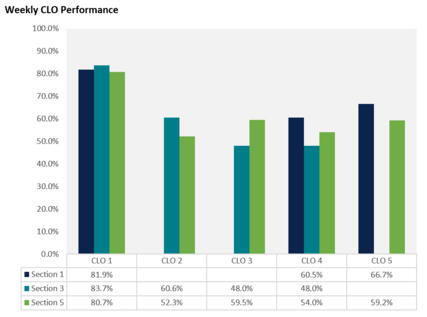
Refine
For one conceptually dense lesson, I developed an assessment that encouraged both reflection and demonstration of applied knowledge.Serving as the SME on that topic, I synthesized the key components of the material and included a real-world example to ground the concepts. To encourage reflection and deeper understanding, learners were prompted to creatively extend the scenario, explore multiple possible outcomes, and critically evaluate which outcomes aligned best with course conceptsThen, I broke the instructional content and the assessment questions into individual slides, as illustrated below.
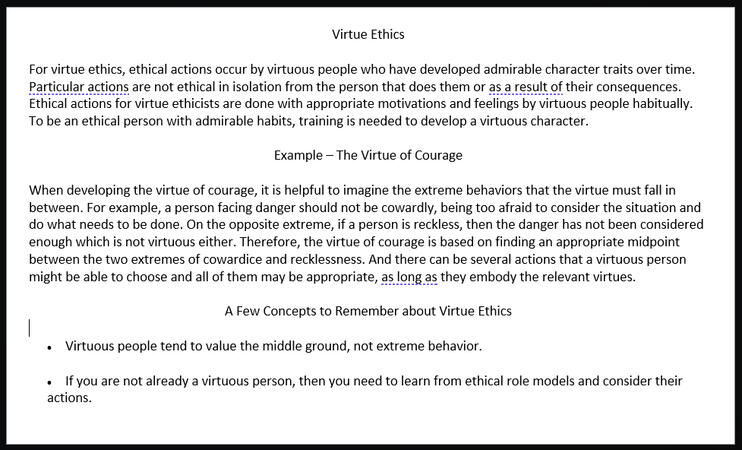
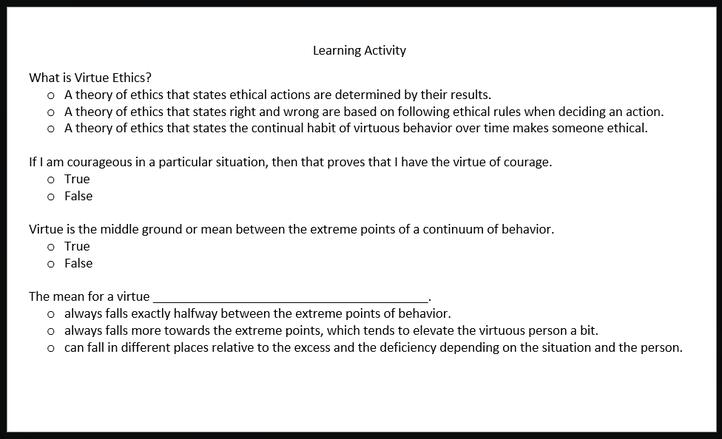
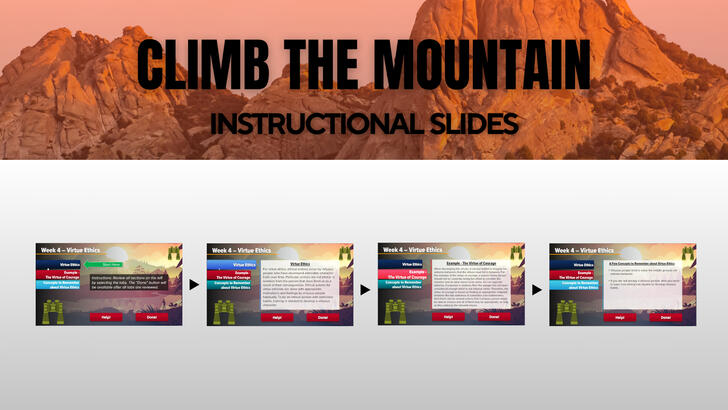
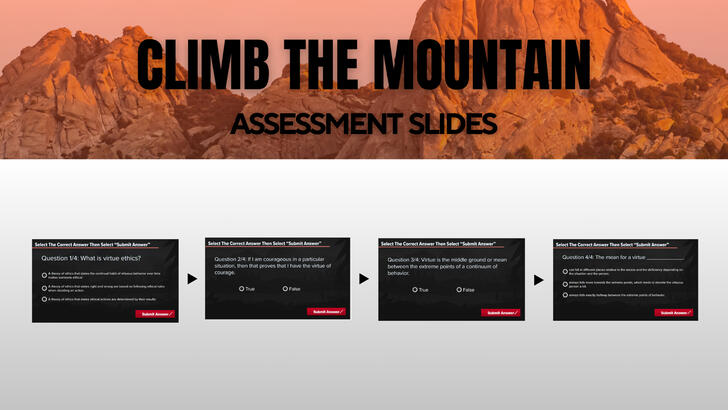
Implementation
Afterward, I consulted with the lead multimedia designer to confirm compatibility of the written assessment with Articulate 360. A seamless implementation into LMS Canvas was ensured by open communication with project stakeholders.A sample video walkthrough is available below.
Response
The interactive assessment was well received by stakeholders, and it got positive feedback during testing. It advanced the course's learning objectives and motivated learners to apply their knowledge.In future iterations, I would encourage strengthening the integration between the game elements and the course content to ensure a more cohesive and instructionally aligned experience.
Testimonial
Interactive Multimedia Lecture Design
for eLearning
Audience: Adult learners conducting advanced research in pursuit of their doctorateResponsibilities: Instructional Design, eLearning Strategist, Graphic Design, Content CreatorTools: Canvas, HTML, Canva, Stripo, Unsplash, Freepik, and other image resources
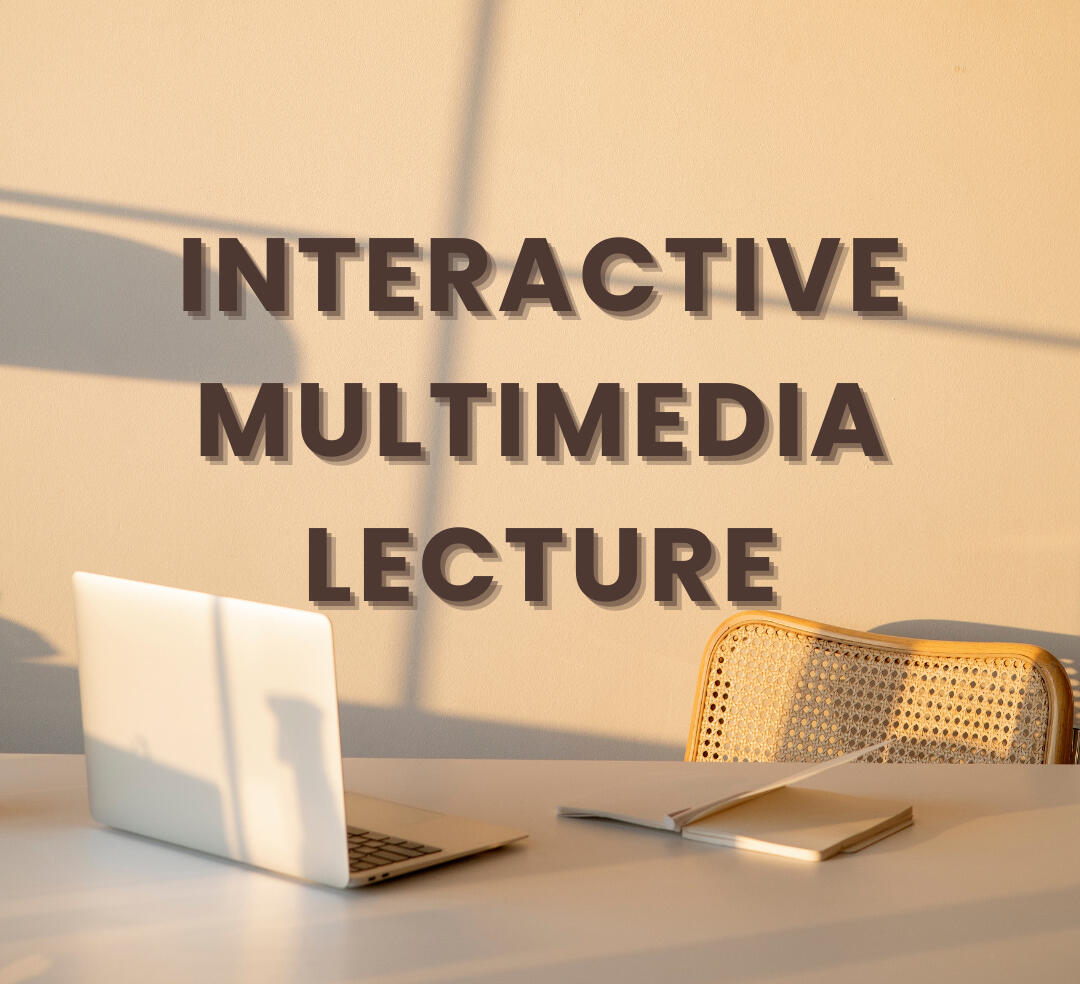
About the Project
It is an unfortunate practice in eLearning environments when lectures are simply written out without effort to enhance the experience for the learner. When being oriented to a new department, I noticed this practice. To create lectures that boosted engagement, retention, and comprehension, I designed lectures with short sections, visual components, interactive elements, and a clear structure.
Challenge
Course lectures were being written in a format that was not engaging or dynamic for learners.
Solution
Design lectures that advance the material of the courses and are visually appealing, compelling the learners to engage in the lessons.
Approach
To avoid cognitive overload and create a pleasing experience for the learner, I chunked material into short segments in a modular design, following a clear logical structure with signaling that identified each section's goals. I also carefully scaffolded content, helping learners gain confidence and competence. Additionally, multimedia elements (meaningful pictures or videos expanding on the material) created visual dividers that supported the mental organization of the content.
Process
Writing and Visual Design
Integration
When writing the lectures,
I developed them as a strategic learning experience to meet outcomes, connect with learners, and support meaningful learning. Ready to be formatted into a more visually interesting format, an example of the raw text can be seen below.
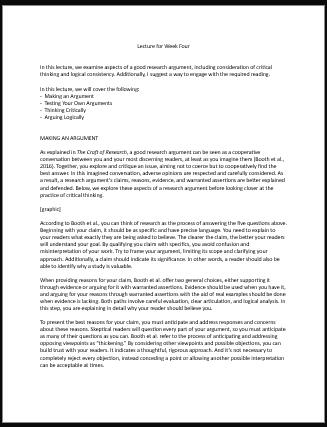
As shown in the designed lecture directly to the right, I decided on a grid layout to create an organized structure. Pictures, graphics, and videos helped segment the material. Also, I added color-themed layers that emphasized different kinds of content. For a review of the integration , see the section to the right of the completed lecture.
Completed Lecture

Now that the modular layout and media enhancements were aligned with the course's learning objectives to support critical thinking and knowledge transfer, the redesign needed to integrate into LMS Canvas.I had to adjust the HTML code taken from the initial draft completed on the platform Stripo. For example, the formatting of references and the start-and-stop times of videos segmented into shorter, watchable portions needed additional code adjustment. Pictures retrieved from Freepik and other sources needed optimization as well.
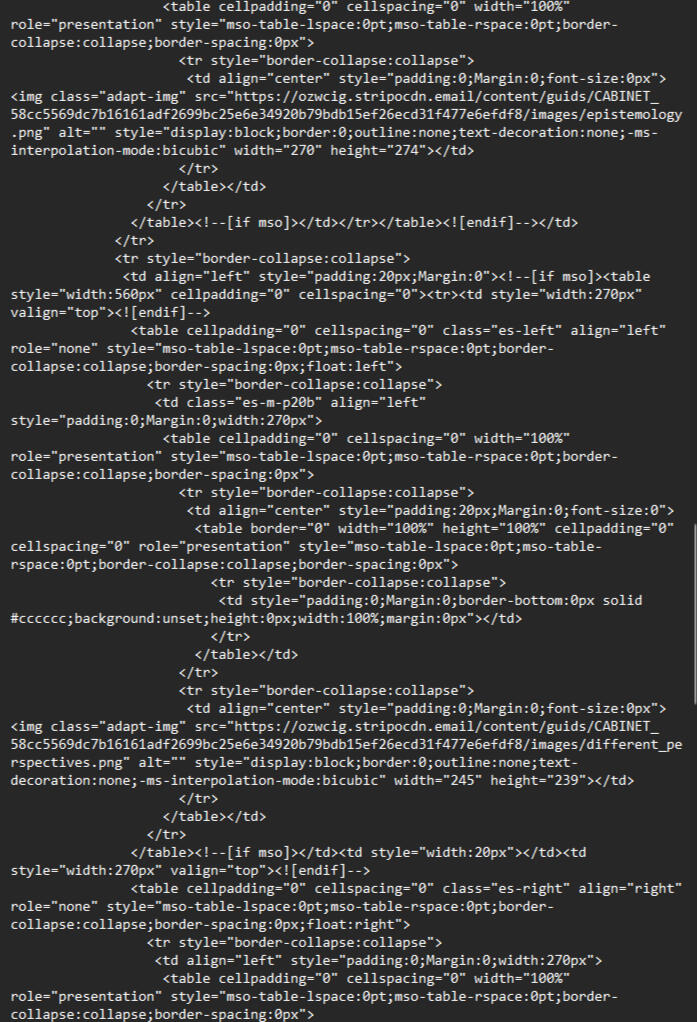
Response
In my communication with students, they have shared that they enjoy the lectures, often claiming that it is rare to get lectures that engage the material and shed more light on the subject. Feedback from the chair of the department was also very enthusiastic.Encouraged by the positive feedback, I continue to refine the design by incorporating more aesthetic cohesion and thoughtfully integrating interactive elements.
Testimonial
Use Calendly to book a 30-minute chat.
Looking forward to speaking with you!









